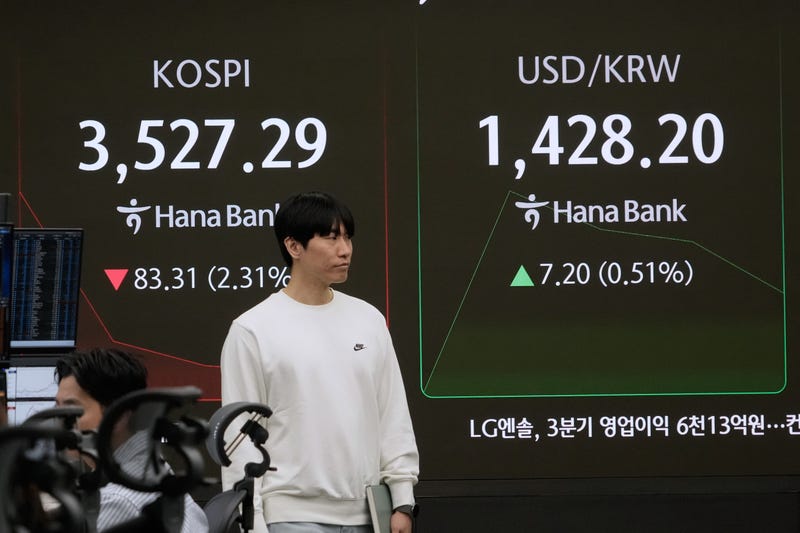
BANGKOK (AP) — European shares advanced on Monday while Asian shares retreated following a rout Friday on Wall Street.
Oil prices gained more than $1 a barrel.
On Monday, Beijing urged U.S. President Donald Trump to withdraw a threat he made Friday to crank tariffs on Chinese-made goods higher after China placed stricter restrictions on exports of rare earths, which are materials critical for manufacturing everything from consumer electronics to jet engines.
The potential for more friction between the world’s two biggest economies rattled markets, giving U.S. shares their worst day since April. But over the weekend, Trump adopted a more conciliatory stance, easing investors’ jitters.
While Trump did not withdraw his threat, he struck a more moderate tone, saying in a Truth Social post Sunday, “The U.S.A. wants to help China, not hurt it!!!”
Germany's DAX gained 0.5% to 24,367.45, while the CAC 40 in Paris also rose 0.5%, to 7,957.52. Britain's FTSE 100 edged up less than 0.1% to 9,431.44.
The future for the S&P 500 jumped 1.4% while that for the Dow Jones Industrial Average gained 1%.
“Markets woke up Monday to the smell of détente — that familiar scent of risk-on optimism that only comes after a weekend of mutual saber-rattling followed by a wink and a handshake from Washington,” Stephen Innes of SPI Asset Management said in a commentary.
“But let’s be clear: this isn’t détente, it’s negotiation theatre,” he said.
Asian shares initially tumbled but regained some of their early losses.
China reported its global exports rose 8.3% in September from a year earlier, the strongest growth in six months and further evidence that its manufacturers are shifting sales from the U.S. to other markets.
However, exports to the U.S. tumbled 27% year-on-year last month, customs data showed. That was a slight improvement from a 33% drop in August, but the sixth straight month of double-digit declines.
In Hong Kong, the Hang Seng sank 1.5% to 25,889.48, while the Shanghai Composite index edged 0.2% lower to 3,889.50.
South Korea's Kospi gave up 0.7% to 3,584.55 and Australia’s S&P/ASX 200 declined 0.8% to 8,882.80.
Taiwan's Taiex shed 1.4% and India's Sensex was down 0.2%.
Markets in Tokyo were closed for a holiday.
On Friday, the S&P 500 sank 2.7% and the Dow industrials dropped 1.9%. The Nasdaq composite lost 3.6%.
Roughly six out of every seven stocks within the S&P 500 fell. Nearly everything weakened, from Big Tech companies like Nvidia and Apple to stocks of smaller companies looking to get past uncertainty about tariffs and trade.
The market may have been primed for a slide. U.S. stocks were already facing criticism that their prices had shot too high following the S&P 500’s nearly relentless 35% run from a low in April. The index, which dictates the movements for many 401(k) accounts, is still near its all-time high set earlier in the week.
Some of Friday’s strongest action was in the oil market, where the price of a barrel of benchmark U.S. crude sank 4.2% to $58.90. Brent crude, the international standard, dropped 3.8% to $62.73 per barrel.
It fell as a ceasefire between Israel and Hamas came into effect in Gaza. An end to the war could remove worries about disruptions to oil supplies, which had kept crude’s price higher than it otherwise would have been.
Losses accelerated following Trump’s tariff threat, which could gum up global trade and lead the economy to burn less fuel.
However, early Monday Brent crude advanced $1.14 to $63.87 per barrel. U.S. benchmark crude gained $1.18 to $60.08 per barrel.
In other dealings early Monday, the dollar rose to 152.20 Japanese yen from 151.89 yen late Friday. The euro fell to $1.1589 from $1.1614.